In this career exploration brainstorm, we encourage you to think expansively about possible career paths, and then create the ideal career short list for you!
The Big 5 personality model is a tool to help you gain emotional insight about your core personality traits and find the best career match for you!
The Big 5 Personality Traits: Get to Know Yourself to Find a Better Career Path
By A Portland Career, and edited by Suzie Sherman and JD Duran
Want a better job match? We can tailor a career assessment just for you

You may have heard of Myers-Briggs or the Enneagram as tools for understanding your personality. But do you know about the Big Five Personality Traits? This five-factor model, developed over several decades by independent researchers, is backed by robust data, and provides an excellent measure for gaining insight about your core personality traits and how they can translate to a better match in your career path!
Getting a better understanding of our personalities can be very helpful in the search for greater job satisfaction. In addition to our skills, interests, and values, our deeply rooted tendencies make certain behaviors easier or harder for us than for others. Assessing your personality traits can, therefore, give you a better sense of your strengths and weaknesses, and what kinds of jobs might be a good match, or more challenging for you. This process can then help you gain clarity on the types of work environments, company cultures, and daily tasks and activities that would be a good fit for your natural inclinations.
Home → Helpful Articles → Career Exploration → The Big 5 Personality Traits: Get to Know Yourself to Find a Better Career Path
We think the most effective career exploration starts with knowing yourself, identifying your passions, and utilizing the best career search tools available. Here are some great posts to help you get started:
- What Does Your MBTI Personality Type Actually Mean for Your Career?
- Crack The Holland Code and Unlock Your Career Aspirations
- How to Decide on a Career Path
- Getting Clear on Your Career Path: Discerning Your Interests and Passions
- Your Career Values Assessment
- Taking Your Skills Inventory: Self-Assessment Time
- The 6 Best Career Exploration Websites to Narrow Down your Job Search
If you want more guidance, get in touch, and we’ll help you explore your aptitudes and interests to find a great career match for you.

The Five-Factor model of personality
One of the most data-driven models of personality (and currently the most widely used and accepted theory of personality in the scientific community) suggests that the many measurable aspects of our personalities cluster around five statistically independent factors. These five factors, which have emerged from a long history of personality research going back at least to the 1930s, were codified in the research of Costa and McCrae (1985, 1992, 2005) and Goldberg (1990, 1992). The Five Factor Model is often called the “Big Five,” and the major factors of the model are defined as:
- Openness to Experience
- Conscientiousness
- Extraversion (also spelled extroversion)
- Agreeableness
- Negative Affect (also referred to as “Neuroticism” or Emotional Stability)
The acronym “OCEAN” can be used as a mnemonic device to remember the five factors, and sometimes the taxonomy is referred to as the OCEAN personality types.
Each of the five components is scored on a continuum or spectrum, rather than a binary or “all or nothing” basis. These five personality factors are observed over decades of research as generally stable over time, and determined by a combination of genetic predisposition and environmental factors. Whatever the etiology of these traits, the Big Five model provides a robust template for understanding our personalities, which can translate to personal emotional insight, and a better, more compatible career path!
A note on “Neuroticism” – it’s an old-fashioned term, and so a lot of researchers are opting for the more neutral descriptor “Negative Affect.” But the classical psychological term “neurotic” really just refers to a “normal level” of negative feeling states that most people experience. Another way to think of neuroticism is “emotional stability”.
A deeper look at the Five Factors and their sub-facets
Each factor in the Big Five consists of six sub-facets, which enrich its description of the personality dimensions that make up this model. It is worth looking at your results carefully to consider the combinations of those sub-facets, rather than focusing solely on the average scores of the five major factors. For example, you might have a low score on Gregariousness, because you’re more comfortable alone than at big parties, and perhaps think of yourself as an introvert. However, this is only one aspect of Extraversion. You might, on the other hand, enjoy being Active and see yourself as quite Cheerful (even if just in private!) If this pattern applied to you, your average score in Extraversion might be higher than you might expect!
We describe each major factor of the Big Five, with their sub-facets below. All descriptions illustrate what a high score on the Big Five personality test indicates for each sub-facet.
Openness to Experience
- Adventurousness. Eager to try new activities, travel, and create unique experiences. Comfortable with change and prefer variety over routine.
- Artistic Interests. A love of beauty, both in art and in nature. Easily involved and absorbed in artistic endeavors and in the natural world.
- Emotionality. Passion and intense emotions. Aware of and easily affected by one’s own feelings and the feelings of others.
- Imagination. Daydreams and fantasy are used as a way of creating a richer, more interesting world.
- Intellect. Playing with ideas. Open-minded to new and unusual ways of thinking. Liking Intellectual debate, puzzles, and brain teasers.
[No judgment! The use of “intellect” here refers to an intellectual style, not intellectual ability, and does not correlate with intelligence as measured in standardized intelligence tests.]
- Liberalism. Seeking progressive change, open to new values in a society. Challenging authority, convention and current laws.
[Don’t box me in! Note that “liberalism” and “conservatism” in psychological discourse do not map neatly with political affiliation, but they do indicate a general inclination about unconventionality.]
Conscientiousness
- Achievement-Striving. Ambitious and striving for excellence and success.
- Cautiousness. Characterized by deliberate decisions and thoughtfulness before taking action, as opposed to impulsivity.
- Dutifulness. A strong sense of obligation, reliable and responsible.
- Orderliness. Well-organized, cleanliness and order. Routines and schedules. Lists and plans.
- Self-Discipline. Able to get to work quickly without procrastinating. Good at focusing and persisting at difficult or unpleasant tasks.
- Self-Efficacy. Belief in one’s ability to be successful, accomplish things and have an impact. A feeling of effectiveness and a sense of being in control of one’s life.
Extraversion
- Activity. Involvement in many activities. Fast-paced, busy, and quick.
- Assertiveness. Speaking out, taking charge, leadership.
- Cheerfulness. Positive moods and feelings are dominant, including happiness, enthusiasm, optimism, and joy.
[The bright side: A low score on Cheerfulness does not mean one has more negative emotions. Negative Affect (or “Neuroticism”) is independent of positive affect, and is measured in that separate factor, below.]
- Excitement-Seeking. Thrill-seeking, needs high levels of stimulation to stay engaged. Not overwhelmed by noise and commotion.
- Friendliness/Sociability. Enjoying other people, easy and positive feelings toward others. Able to reach out to others effortlessly.
- Gregariousness. Finding the company of others pleasantly stimulating and rewarding. Not much need for privacy or time to oneself.
Agreeableness
- Altruism. Giving to and helping others is genuinely rewarding. Doing things for others is a form of self-fulfillment, rather than an obligation.
- Cooperation. Willing to compromise or deny one’s own needs in order to get along with others.
- Modesty. Humble, lack of need to brag, show off, or claim to be better than others, for fear of hurting relationships or being seen as arrogant.
- Morality. Sticking to rules, candidness, sincere in word.
[On the flip side: A low score on morality, in this context, does not indicate unprincipled or immoral, but might show a different style of ethical ideals, for which strict truthfulness and rule-following are not as essential.]
- Altruism. Giving to and helping others is genuinely rewarding. Doing things for others is a form of self-fulfillment, rather than an obligation.
- Cooperation. Willing to compromise or deny one’s own needs in order to get along with others.
- Modesty. Humble, lack of need to brag, show off, or claim to be better than others, for fear of hurting relationships or being seen as arrogant.
- Morality. Sticking to rules, candidness, sincere in word.
Negative Affect (Neuroticism, or Emotional Stability)
- Anger. Easily irritated or annoyed. Tending toward feelings of resentment and bitterness when things don’t go one’s way.
[Independent factors: Note that this scale measures the tendency to feel angry or irritable – whether or not one expresses annoyance and hostility depends on one’s level of Agreeableness.]
- Anxiety. Marked worry about the future, fear of specific situations, or a general heightened sense of fear moving through the world. Prone to stress and to feeling tense, jittery, or nervous.
- Depression. Common feelings of sadness, and tendency to rate oneself lower on measures of self-esteem.
[Not a diagnosis! Note that this personality assessment does not measure either clinical depression or clinical anxiety.]
- Immoderation. Strong cravings for short-term pleasures. Tendency to overindulge and give into impulsive desires. A low score indicates a better ability to moderate.
- Self-Consciousness. Worry about what others might think. Easily embarrassed. Concern about rejection and ridicule leads to shyness around others, especially strangers.
- Vulnerability. Tendency toward overwhelm. Experiencing panic, confusion, and helplessness when under pressure.
Taking care of yourself: If you notice your scores on this personality facet are highly elevated, consider connecting with a therapist if you haven’t already to provide yourself with the support you deserve.
What can a Big Five score tell us about our personality and career aptitudes?
Now that you have an overview of the Big Five personality traits, let’s put this model into practice in your career search. Below, we provide several websites where you can take a free personality test based on the Five-Factor model. We also share two of our clients’ results on the Big Five test, and how this personality assessment helped them in identifying career choices, and led to increased job satisfaction, as well as overall life satisfaction.
What can a Big Five score tell us about our personality and career aptitudes?
All questionnaires listed here are anonymous and don’t track personal data. Please be aware that taking these tests does not constitute psychotherapeutic diagnosis or treatment. These tests are meant for personal education purposes only!
IPIP 300 Item Big Five Assessment:
personalityassessor.com/ipip300
IDR Labs Big Five Personality Test with 30 Subscales:
idrlabs.com/big-five-subscales/test.php
The Big Five Project Personality Test:
outofservice.com/bigfive
Big Five Personality Test from the Open Source Psychometrics Project:
How the Big Five personality test helped our clients
Once you’ve taken one or more of the online personality tests, keep your scores handy as you consider our clients’ stories below. Notice that in both client cases, their scores showed quite a lot of variations on the sub-factors within each major personality trait. This level of detail is helpful in gaining deeper insight on our career journeys. We illustrate one client’s detailed scores below.
Case Example 1: Geek or Gardener? Kathy’s Cravings for Creative Order and Solitude
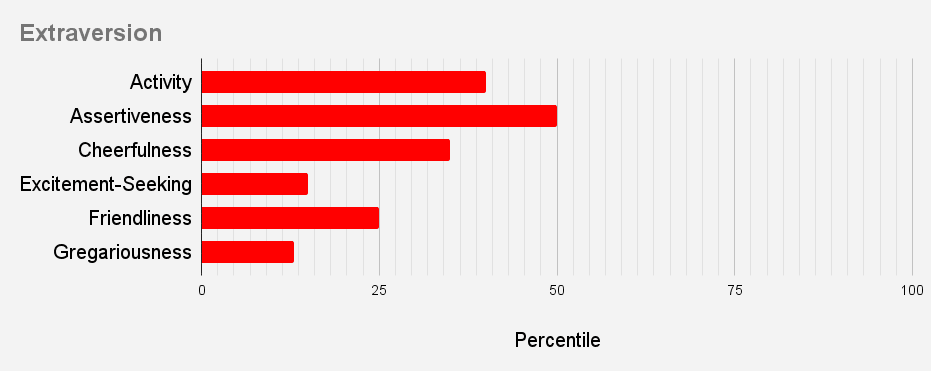
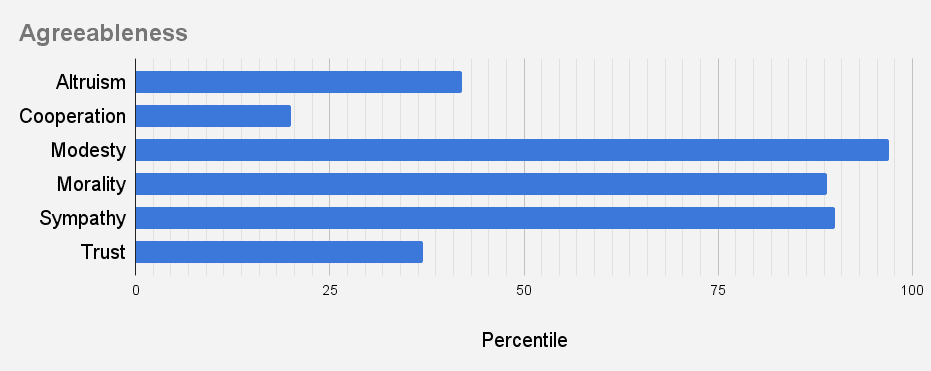
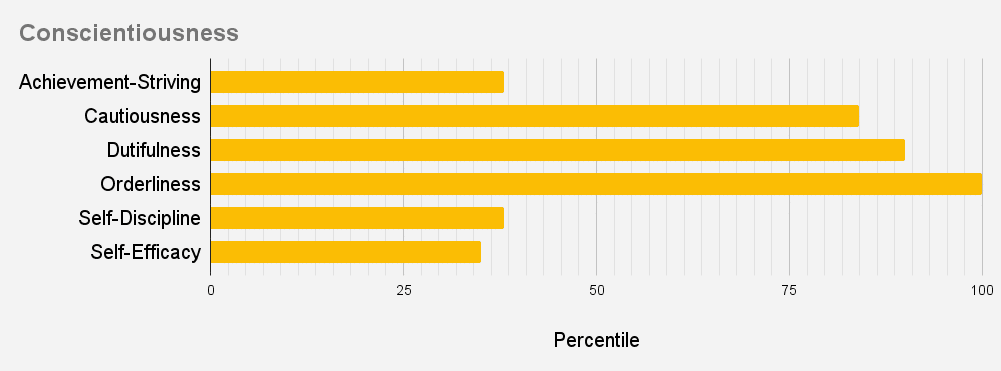
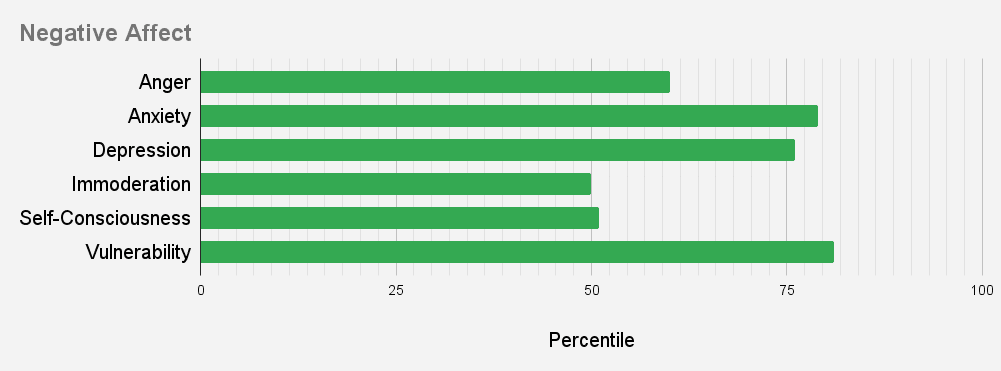
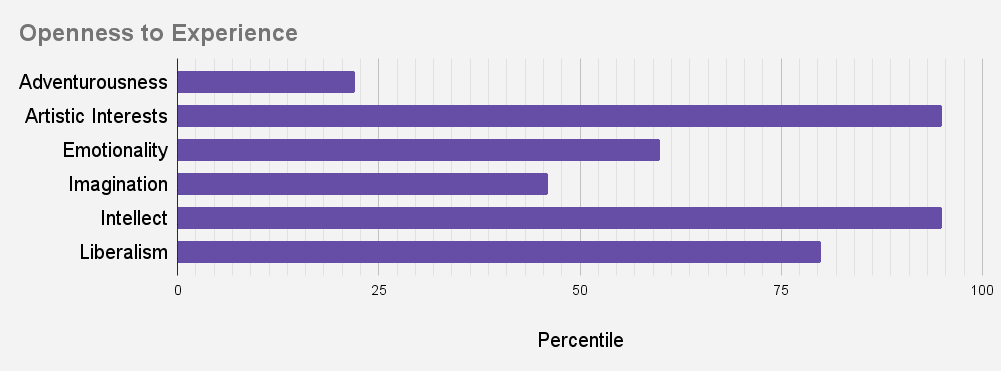
Kathy’s Personality Scores as measured by IPIP-NEO (the International Personality Item Pool Representation of the NEO Personality Inventory – Revised: NEO PI-R)
Kathy wanted to figure out her next career move. Before taking the Big Five personality assessment, she expressed that she experienced a lot of satisfaction in creating, perfecting and maintaining order in systems. She enjoyed working with databases, and organizing information. Outside work, she had a passion for gardening, and loved weeding and pruning (a similar kind of thorough and detailed application of those skills!) It came as no surprise, of course, that she scored high on Orderliness (a sub-facet of Conscientiousness). However, she also had very high scores in Artistic Interests and Intellect (both sub-facets of Openness to Experience). Thinking of those three traits in combination reinforced the idea that some kind of database or classification work would be a good fit for her, and maybe in a naturalist or science context.
There were other patterns in her profile that were worth thinking and talking about in our sessions: her low scores not only in the Extraversion factor overall, but also in Cooperation (a sub-facet of Agreeableness) and Adventurousness (another sub-facet of Openness to Experience) suggested that she would be happiest if she could work mostly by herself, rather than in a team. On the other hand, it was interesting to see that, while she scored very highly on Dutifulness (a sub-facet of Conscientiousness) suggesting she would complete tasks reliably, she scored rather low on Achievement-Striving, Self-Discipline, and Self-Efficacy (all sub-facets of Conscientiousness, as well). Those low scores might caution her against looking for very independent, project-based work, where she would need a lot of self-motivation to start and complete tasks. So, overall, despite her tendency to be happier alone, she learned the valuable insight that she might thrive better in a position that would offer her clear tasks and deadlines!
Case Example 2: Desktops or Airplanes? Jeremy the Intellectual Extravert
Another client, Jeremy, was considering an offer by an airline to re-enter and advance his previously begun career as a pilot, which he had enjoyed more than his current office work in finance (he found this desk job draining and boring!) In his case, very high Extraversion and Agreeableness scores, as well as high Adventurousness, supported this preference: it was easy for us to see how the teamwork, leadership responsibilities, and the required travel of piloting would all be attractive to him and unlikely to burn him out!
One aspect that would not have come up in our conversation without doing this assessment was Jeremy’s high score in Intellect (a sub-facet of Openness to Experience). We discussed whether he would encounter enough intellectual challenge and stimulation as a pilot, and he considered the possibility of adding some finance consulting projects on the side. He also acknowledged that during long flights, there would be a lot of time for him to pursue intellectual challenges, but that this would require some discipline in setting himself additional goals and tasks. Recognizing this was an important insight for him, his high score in Self-Discipline was an encouraging indicator that he could realistically do this.
Which personality traits matter for your career success?
Coming to know where you fall on all the Big 5 personality traits spectra will be helpful in your career path formulation. But let’s take a look at some particular dynamics that might not be obvious at first glance.
- Are you attracted to the helping professions? For social careers that involve a lot of exposure to human suffering, such as first responders or social workers, pay attention to these personality traits and their sub-facets:
- Negative Affect overall (the tendency to experience a lot of negative emotions). In particular, look at the sub-facet Vulnerability, which tells us something about a person’s capability to cope with high amounts of stress. A high score here might not bode well for this type of career.
- Sympathy (a sub-facet of Agreeableness). Perhaps counter-intuitively, we would caution someone from entering a helping profession if they have a particularly high sympathy score, because such tenderheartedness might cause a lot of vicarious suffering, mental health stressors, and put someone at a higher risk of burnout.
- High Altruism, on the other hand, the tendency to derive genuine pleasure from helping others might enable someone to help or give very generously without burning out.
- Conscientiousness—or lack of it—is relevant for any career.
- Conscientious people are hard-working and achievement-oriented, and are consistently rated as outstanding employees, independent of career field.
- People with high scores in Achievement-Striving will naturally look for advancement and leadership opportunities in their careers, and may feel unfulfilled without them, especially when combined with high Assertiveness (under Extraversion).
- Scoring low in Conscientiousness, on the other hand, can indicate an important growing edge for improving one’s career opportunities. Despite their less ambitious natural inclinations, low Conscientiousness scorers can put systems in place to remind themselves of deadlines and tasks, or schedule regular check-ins with peers and supervisors to make sure they are on track.
- Personality traits most relevant to making a big career change:
- People who have very high scores in Openness to Experience, especially Adventurousness, might find the idea of a big change much more attractive than others, and might find more success in handling the training process.
- On the other hand, people with high scores in Negative Affect might experience a lot of stress and negative feelings in making a major career change. Low Agreeableness can also predispose someone to more resistance in developing trusting and cooperative relationships with new supervisors and co-workers.
Knowing these aspects of your personality can help you cultivate the self-awareness you need to adapt to new work environments.
A reminder for self-reporting your personality traits in these stressful times:
If you are seeing high scores in Negative Affect (Neuroticism on some tests), remember that these are difficult times: the pandemic, and a rapidly changing economic reality are part of what we’re all contending with. If this high score area feels true to you, it’s best to acknowledge it and work with it. But your Negative Affect score might be higher than normal at the moment. If you are currently very unhappy at work, that only adds to the distress that might reflect in your score. If your scores are surprisingly high in the sub-facets of Anger, Anxiety or Depression, this could serve as a wake-up call to make a serious change and seek some professional therapeutic help, even if just in the short-term.
Final thoughts on the Big Five personality traits
The Big Five personality assessment is a robust, science-backed model that can help you gain insight about your core personality traits. This can lend itself to greater emotional well-being and can translate to finding a much better match in your career exploration. Self-knowledge about the kinds of situations that are breezy or more challenging for you allows you to have a more realistic idea of the types of work environments that will foster learning, growth, and provide social and intellectual challenge and development. The Big Five is a valuable tool in a more effective and holistic search for a meaningful career.
Key takeaways
- The Five-Factor model of personality traits, or The Big 5 model, is a scientifically tested theory of personality using five independent main personality traits, and 30 sub-facets of these traits, to assess major areas of human personality.
- The five major personality factors are Openness to Experience, Conscientiousness, Extraversion, Agreeableness, and Negative Affect (Neuroticism.)
- Decades of research have shown these five traits to remain fairly consistent in respondents over time, grounded both in genetic predisposition and environmental factors over the course of one’s life.
- The Big Five personality model can be used as a tool to gain emotional insight, as well as awareness about one’s strengths and weaknesses to help assist in an effective job search, or in making a big change in one’s career path.
Related articles you might be interested in:
The 6 Best Career Exploration Websites to Narrow Down your Job Search
Discover the 6 Best Career Exploration Websites to find job titles, requirements, salary range, and market outlook for the most promising career paths!
Your Career Values Assessment
So often, our careers seem to be at odds with our core values. This career values exercise gives you permission to think outside the cubicle and find work you love!
How to Decide On a Career Path
Deciding on a career path can feel overwhelming, but with clear objectives, solid self-assessment, and a healthy trust of your gut instincts, you can do this thing!





